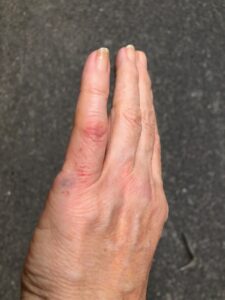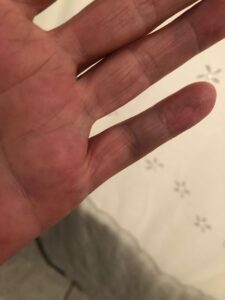What a rotten time for the ice-maker to go kaput. Supposedly there was a simpler time. I wonder when that was. I do recall using ice trays, once upon a time.
I vaguely recall watching a movie wherein the premise was about a family trapped in a fifties- bunker created by the science-geek dad, and they wanted out but couldn’t escape the timed-hatch. Their new “labor-saving devices,” systematically went haywire.
Technically, the vacuum cleaner was invented in the late 19th century and many other labor-saving devices trickled in throughout the early twentieth century including the microwave oven after WWII, but the fifties are known for widespread, middle-class use of these devices, to free up families, supposedly for more leisure time to enjoy their upward mobility.
Computer science and technology has leapt light-years from our first Mac Plus in the mid to late eighties. The first brick-sized mobile phones have moved on up through the “palm pilot” to 5g devices that do things we never dreamed of “back in the day.”
And we have Siri and Alexa in our cars, homes, and pockets, to remind us what to buy, when to wake up, and where to turn, toward our destination. Our new technology is not so different from the robot from that aforementioned movie where the people were trapped in their bunker-gone-wrong.
This was all a set-up for a complaint. Our ice-maker hasn’t been making ice for a few weeks now. I tried everything that the booklet says in the page called, “trouble shooting.” This, in addition to some common sense, which apparently isn’t all that sensical, because it hasn’t worked thus far, and hasn’t’ redeemed any ice our direction.
I thought, oh well, summer is over and the demand for ice isn’t as plentiful now and I’ll keep trying DIY until and unless those efforts prove useless. For some of us, asking for directions is a last resort. We’d rather be a lost explorer than a human needing help. So, I’ll most likely resort to asking our favorite plumber if he knows ice makers.
In our delay in actually getting the ice-maker repaired, I forgot that ice has some uses other than for cooling down summer drinks. Particularly I am referring to the “icing-down” of a bruise, sprain, surgical site or otherwise traumatized body part.

I tripped over a rock while jogging along one of my familiar wooded paths. It was that slow-motion headlong sprawl that I’ve experienced before so I knew even while in motion that this might not end well. I pretty much knew that I wasn’t going to be able to self-correct this time. I was falling.
For this outdoor adventure I would forego the walking stick which had saved me a bunch of times in the past while maneuvering known rocky paths. I had planned to pick up litter, found roadside adjoining the woods, with a dollar store grabber, not designed to save one from a fall.
When you fall at my age, it’s embarrassing on several levels. You either feel like an impulsive four-year-old who will cry for a minute then get up and “shake-it-off.” Or, you mimic an elderly actor in the “I’ve fallen and can’t get up”-commercial for personal alarms, found in the AARP magazine.
In either scenario, it’s beyond humbling, to fall. Don’t tell me that when you’ve tripped on a public sidewalk, you don’t try to save face by looking down at the crack accusingly because it was the crack’s fault.
I was just barely into my jog, so from my position on the ground, I took a couple of pics of the injuries to my left-side and hand, texted them to my spouse and asked him to procure some ice from our kind neighbors, while I finished my workout. “No,” I didn’t want him to pick me up, just find some ice so that I could ice my sprained finger/hand when I got home.



I held my left hand up in the usual jogging position and finished an abbreviated route, to satisfy my workout requirement for the day but get back home before any serious swelling ensued. While trotting along, I pictured an old stainless steel ice tray with the handle on the top to loosen the frozen cubes, kept in my storage pantry for freezing lemon or lime juice for various recipes. But I’ve heretofore not needed it for frozen water cubes because of the labor-saving device called an ice-maker!
All of this made me contemplate simpler times with lesser technology and fewer labor-saving devices. I can’t tell you how many times I’ve had the conversation with those more senior than me who lament about “these complicated times.”
With retail cashiers, online “chat” agents, and customer service representatives from our paper supplier to utility company clerks, I’ve discussed over and over again, that “computers” and “smart phones” make everyday life so much more convenient “when they work.” But, oh how frustrating when they’re “down.”
That reminds me of a prayer I sometimes pray, “Lord God please cause this medicine to work for me and not against me….” Doesn’t our modern technology act the same? Sometimes although it’s intended to be a convenience, it just complicates things.
Sometimes the band from the old smart watch won’t fit the new smart watch. The batteries from the old device won’t fit the new device. The software from the old computer won’t work with the new one. The old television won’t work with the new cable box. The adapter/charger from the old technology doesn’t have the right plug for the new technology.
The next generation will be complaining about how simple our lives were compared to their complicated ones. That’s the way of the world, it seems. We’re alive, to complain another day. So there.


